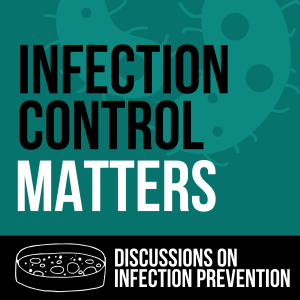
Infection Control Matters
Science Podcasts
We are a group of professionals who work in the field of infectious disease and infection prevention and control. In this podcast series, we discuss new research and issues on the topic of infection prevention and control. We will pick new papers of interest and will discuss them, often with an author of the paper who can give us some insights into the research that go beyond the written paper. Authors will include nurses, doctors, academics, clinicians, administrators and leaders. We should stress that all of our comments relate to our own opinions and that they do not necessarily reflect those institutions and employers that we relate to. We welcome comment, suggestions and ideas. Please consider subscribing for updates and to find collections of topic specific podcasts at www.infectioncontrolmatters.com
Location:
Australia
Genres:
Science Podcasts
Description:
We are a group of professionals who work in the field of infectious disease and infection prevention and control. In this podcast series, we discuss new research and issues on the topic of infection prevention and control. We will pick new papers of interest and will discuss them, often with an author of the paper who can give us some insights into the research that go beyond the written paper. Authors will include nurses, doctors, academics, clinicians, administrators and leaders. We should stress that all of our comments relate to our own opinions and that they do not necessarily reflect those institutions and employers that we relate to. We welcome comment, suggestions and ideas. Please consider subscribing for updates and to find collections of topic specific podcasts at www.infectioncontrolmatters.com
Twitter:
@1healthau
Language:
English
Resourcing of hospital infection prevention and control programs
Duration:00:24:59
Hospital or Crime Scene? What Forensic Science Reveals About “Clean”
Duration:00:27:10
AMR at a National level - The 2025 ESPAUR Report
Duration:00:56:10
2025 Christmas Special
Duration:00:48:19
Unseen Reservoirs, Unseen Risks: Integrating Wastewater Surveillance with Patient-Level Insights into C. auris Spread
Duration:00:18:25
Can ward rounds transform IPC education?
Duration:00:24:40
Reducing harm at the Front Line: Oral Care driving down C. difficile and Line Care - the Power of Better Data
Duration:00:21:33
Posters from the 2025 Innovation Academy at ICPIC and from the UK IPS Conference
Duration:00:15:54
Infection Control Matters Live from the 2026 IPS Brighton Conference
Duration:00:38:12
Cutting CDC and IPC funding in the US - Implications and what can we do?
Duration:00:24:35
Safeguarding During Transit: RAF Expertise in High Consequence Infectious Disease Retrieval
Duration:00:24:03
The no diaper (AKA nappy) zone - reducing CAUTI?
Duration:00:21:25
Can modelling tell us what factors influence CAUTI in long and short-term catheters?
Duration:00:16:20
Leading Public Health, ID and IPC during challenging times
Duration:00:28:50
What's new in Surgical Site Infection Prevention? Update from EUCIC
Duration:00:31:47
Posters from the Hong Kong Infection Control Nurses Association conference
Duration:00:09:37
The Plume Room - adventures in toilet hygiene
Duration:00:20:54
Automated national HCAI surveillance - potential or pipedream?
Duration:00:15:42
A re-introduction to Infection Control Matters 1500 days on
Duration:00:11:15
National vs local IPC Guidelines - Lost in Translation?
Duration:00:35:05